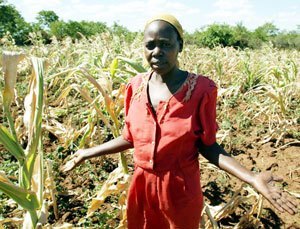
WINTER wheat production has drastically fallen in the past few years in Matabeleland region, as farmers abandon the crop due to lack of capital, intermittent power cuts and uncompetitive prices on the market.
BY MUSA DUBE
A visit to Umguza and Nyamandlovu districts in Matabeleland North by Standardcommunity recently revealed a sorry state as large tracks of land where winter wheat used to be grown are now covered with tall grass and shrubs.
Umguza District, one of the prime farming areas in Matabeleland North, used to produce a substantial amount of winter wheat before the 2000 land reform exercise, which saw the displacement of hundreds of white commercial farmers.
Farmers who spoke to Standardcommunity recently said they could not plant winter wheat because they did not have enough capital to buy seeds and fertilisers. They also complained about regular power outages.
“A majority of us no longer plant winter wheat because we do not have the inputs. The government always promises that it would avail loans and inputs for winter wheat production, but that never happens,” said Vusa Nyoni, an A2 farmer from Umguza.
“Winter wheat is no longer viable because the gazetted producer price is far below the production costs. To make matters worse, we don’t get payment for the delivered produce in time.”
Ndumiso Ncube, an A2 farmer, said the hectarage for wheat production decreased this year after Zesa introduced pre-paid metres.
- Chamisa under fire over US$120K donation
- Mavhunga puts DeMbare into Chibuku quarterfinals
- Pension funds bet on Cabora Bassa oilfields
- Councils defy govt fire tender directive
Keep Reading
“The Zesa pre-paid system discouraged us from growing the wheat crop because we could not afford the payments,” said Ncube. “We also faced water problems because of our poor irrigation infrastructure. ” Matabeleland North agriculture extension officer (Agritex) provincial agronomist, Davison Masendeke confirmed that fewer farmers were still taking up winter wheat farming.
He said farmers had targeted to plant 539,8 hectares last year, but only managed to plant 356 hectares.
“The target area was 539,8 hectares last year but the farmers managed to plant 356 hectares while the target area is 470,25 hectares this year,’’ said Masendeke. Winter wheat production has been on the decline in the last decade in Zimbabwe.
Only 12 000 hectares against a targeted 45 000 were planted in 2011, while only 4 000 hectares were planted against the targeted 26 000 hectares last year.
As a result, the government has been forced to import the cereal crop to meet the local demand.
FARMERS TO VENTURE INTO TOBACCO FARMING
A number of farmers in Matabeleland North are contemplating venturing into tobacco growing.
“Next year, I will venture into tobacco farming, as the crop is currently fetching a good price on the market. The type of soil we have here is suitable for tobacco growing,” said Lungile Sibanda.
Tobacco has been the country’s largest export earner for many decades, accounting for a third of all foreign currency earnings.











